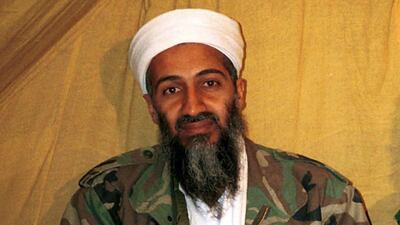In the biggest release of its kind, the Central Intelligence Agency (CIA) made public on Wednesday more than 470,000 files -including audio and video- that belong to former Al Qaeda leader Osama bin Laden and were captured during the raid that killed him in Abbottabad, Pakistan in 2011.
The trove will take years to go through but snippets of it reviewed by experts- including a 228-page diary- offer new details on the political, social, even family thinking of Al Qaeda’s deceased leader.
CIA director Mike Pompeo said the release of the documents "provides the opportunity for the American people to gain further insights into the plans and workings of this terrorist organization." The documents contain videos, audios, letters and his journal and can be found at www.cia.gov.
While the videos range from a long list of movies like “Ice Age”, “Cars” and “Antz” to documentaries Bin Laden watched about himself such as “CNN Presents: World’s Most Wanted”, it is two videos of his son Hamza bin Laden during his wedding in Iran that made the headlines. Along with photos of the young son, floated to be apparent heir in Al Qaeda, these are the first public images seen of him.
The Hamza bin Laden wedding video in Iran also showed Al Qaeda members in attendance. This, along with documents and letters written by Osama bin Laden expose an unique dynamic between the terrorist group and Tehran.
_______________
Read more:
Al Qaeda leader calls for attacks on the United States
Bin Laden's son calls Muslims to Syria jihad
_______________
The Long War Journal published sections of the documents that relate to Iran ahead of their release on Wednesday. Thomas Joscelyn and Bill Roggio of the Foundation for Defense of Democracies wrote detailing the 19-page document on Iran and Al Qaeda, that Tehran offered some "some Saudi brothers in Al Qaeda ‘everything they needed,’ including money, arms and training in Hezbollah camps in Lebanon, in exchange for striking American interests in Saudi Arabia and the Gulf.”
The document claimed that “Iranian intelligence facilitated the travel of some operatives with visas, while sheltering others.” According to the file, Al Qaeda members later violated the terms of the agreement and Iran eventually cracked down on the network.
The same document speaks of a “pragmatic Iran” , that Al Qaeda is not at war with Tehran and some of their “interests intersect,” and adds that “the animosity between Iran and America is real.”

Bin Laden’s journal written in Arabic, presented in a form of a yellow notebook with a stripe and the words “lucky exclusive notebook”, sheds light on a mix of personal and political views for the former Al Qaeda leader.
In the journal we rediscover that the man behind the September 11 terrorist attacks in New York, is no fan of the West. He recalls a trip he did to London at age of 13 (in 1970).
“I got the impression that they were a loose people, and my age didn’t allow me to form a complete picture of life there ...we went every Sunday to visit Shakespeare’s house. I was not impressed” he wrote, attributing his derision to “loose morality” and decadence in the West.
Bin Laden interviews himself in some of sections of the diary. From the sequencing of events it appears to be written around the Arab Spring and the upheaval that many countries witnessed across the region and were in some cases exploited by Al Qaeda.
Hassan Hassan, a senior fellow at The Tahrir Institute in Washington, reviewed the diary and referenced Bin Laden’s evolving views from high school days till his capture on political Islam, Jihad, and events in the Arab world.
On page seven of the diary Bin Laden writes: “I was committed with the Muslim Brotherhood. Their resources were limited. I read Sira (prophet’s biography). Meeting once a week, a set of pages. Religious influence wasn’t much.”
The former Al Qaeda leader seemed ecstatic about the Arab Spring, he asks himself “Q: what’s our interest in the fall of Bahrain?”, then answers “the fall of all regimes is in the interest of the Ummah [nation]. Bahrain is easy to bring down, and its fall means the Islamists will rule.”
Bin Laden also seemed optimistic about the prospects of Al Qaeda in Yemen, and wrote as referenced by Mr Hassan that “it’s important for Jordan to fall before Saudi Arabia; Iraq is heating up the situation in Jordan.”


